In this article:
Tooth decay and cavities are quite common and largely the result of negligent oral hygiene. If left untreated, they can lead to severe toothache, infection, and even tooth loss, among other complications.
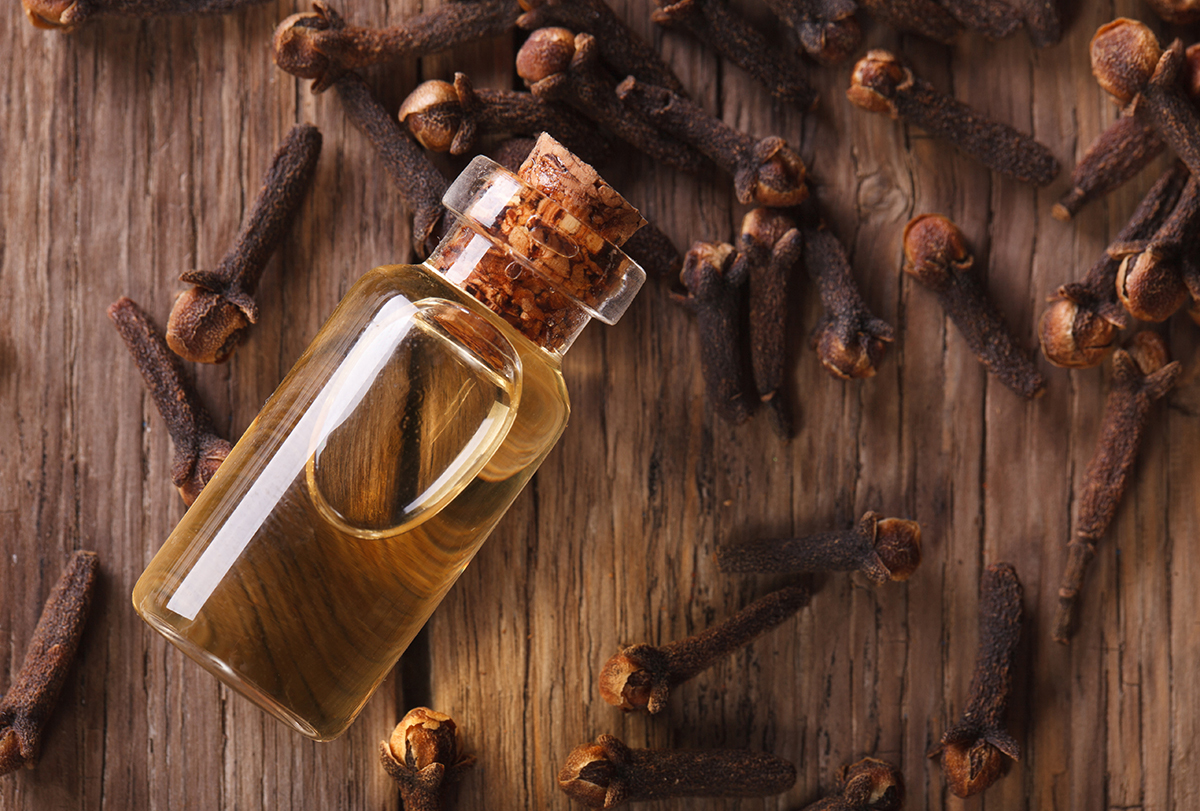
It is of utmost importance to visit your dentist for a checkup if your teeth become discolored, painful, or highly sensitive to cold and hot stimuli which are all tell-tale signs of dental damage.
Along with the doctor-recommended treatment, you can try certain natural remedies to soothe the toothache, disinfect the gums and improve overall oral health.
Home Remedies for Tooth Decay and Cavities
Here are some things you can do at home to relieve the discomfort caused by tooth decay and promote healing:
1. Dab clove oil
Clove is one of the most important ingredients in treating any kind of dental issue, including cavities. Due to its anti-inflammatory, analgesic, and antibacterial properties, clove can help alleviate pain and prevent the cavity from spreading. (1)
How to use:
- Dilute 2 to 3 drops of clove oil with ¼ teaspoon of sesame seed oil. Put a few drops of this solution on a cotton ball and dab the solution on the affected tooth. Repeat this every night before going to bed.
- Another option is to gently chew a whole clove to extract its oil. Then, keep the clove under your tongue for several minutes.
Note: Do not use clove oil in excess or too frequently as it is best used for temporary relief.
2. Swish with salt water
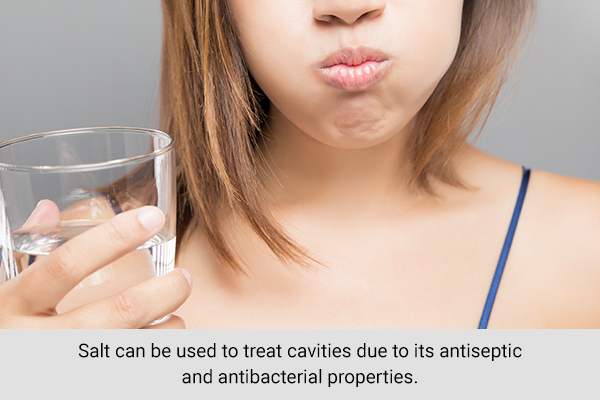
Salt can also be used to treat cavities due to its antiseptic and antibacterial properties. It can reduce inflammation, ease pain, draw out any infection, and prevent the growth of bacteria in the mouth.
Using salt containing added fluoride in your diet can help provide strength to your teeth. (2)
How to use:
- Dissolve 1 teaspoon of salt in 1 glass of warm water. Swish a mouthful of this solution in your mouth for 1 minute, concentrating on the affected tooth. Follow this treatment three times a day until your symptoms subside.
- Alternatively, mix ½ teaspoon of salt and a little mustard oil or lemon juice to make a paste. Massage the gums gently with this paste for a few minutes, and then gargle with warm water. Repeat twice daily for a few days to kill bacteria.
3. Do oil pulling
Oil pulling is an age-old practice that can reduce cavities as well as bleeding gums and bad breath. It helps clean the mouth of harmful bacteria that are responsible for different types of dental problems. It helps to clean the plaque that causes tooth decay. (3)
How to use:
- Put 1 tablespoon of sesame oil in your mouth.
- Gently swish it around for about 20 minutes.
- Spit it out. Avoid gargling or swallowing the oil.
- Rinse your mouth with warm water. Use salt water for added antimicrobial benefits.
- Brush your teeth as usual.
- Do this daily in the morning, on an empty stomach.
This can also be done with sunflower or coconut oil.
4. DIY garlic mouthwash
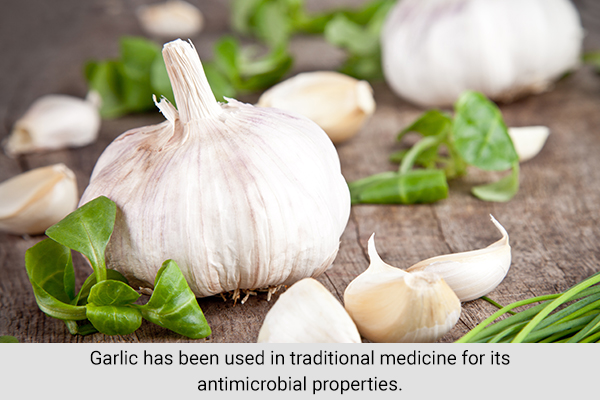
Garlic has been used in traditional medicine for its antimicrobial properties.
A study in 2013 supported the antimicrobial activity of garlic extract against microbial pathogens that cause plaque formation. (4)
How to use:
- Prepare a paste from 3 to 4 crushed garlic cloves and ¼ teaspoon of rock salt. Apply it on the infected tooth. Leave it on for 10 minutes before rinsing with a mouthwash. Do this twice daily for a few weeks to reduce cavities.
- You can also rub garlic oil on the affected tooth to get quick relief from pain due to a cavity.
- Eating raw garlic regularly can also provide effective results.
5. Try licorice
According to a study published in the American Chemical Society’s Journal of Natural Products, licorice root may help keep teeth healthy. There are two effective antibacterial compounds in dried licorice root – licoricidin and licorisoflavan A – that can prevent the growth of cavity-causing bacteria. Plus, this herb can also reduce plaque. (5)
How to use:
- Use dried licorice root powder to brush your teeth on a regular basis.
- You can also use a soft stick of licorice like a toothbrush to brush your teeth daily.
6. Massage with turmeric paste
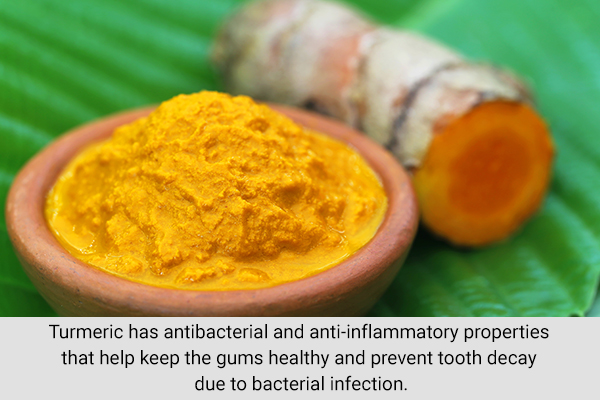
In Ayurveda, turmeric is often used to provide respite from cavity pain. It has antibacterial and anti-inflammatory properties that help keep the gums healthy and prevent tooth decay due to bacterial infection. Turmeric can also be used as a pit and fissure sealant and mouthwash. (6)
How to use:
- Apply some turmeric powder on the affected teeth. Leave it on for a few minutes and then rinse well with warm water.
- Another option is to mix ½ teaspoon of turmeric powder with a little mustard oil and use the mixture to massage your teeth and gums. Leave it on for 10 minutes and then spit it out.
Repeat either of these remedies once or twice daily for at least a few days.
7. Use Indian lilac sticks
Indian lilac, also known as neem, is another popular remedy for cavities. Its antibacterial properties can easily destroy cavity-causing bacteria. Plus, it helps maintain healthy and strong teeth and gums. (7)
How to use:
- Rub the juice of neem leaves on the teeth and gums. Leave it on for a few minutes and then rinse it off with warm water. Follow this treatment one to two times daily.
- You can also use soft neem sticks to brush your teeth.
- You can even use a toothpaste containing neem oil.
8. Eat Indian gooseberry
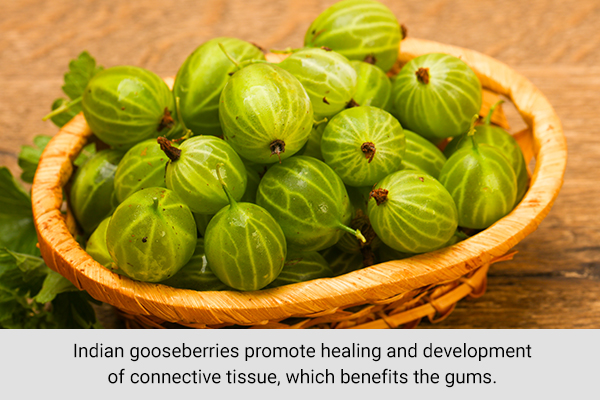
Another well-known herb that can help reduce cavities is Indian gooseberry, also known as amla. Being high in antioxidants and vitamin C, it combats bacteria and fights infections.
It also promotes healing and development of connective tissue, which benefits the gums. Additionally, it cleans the mouth and helps get rid of bad breath. (8)
How to use:
- Eat one fresh amla daily.
- You can also take ½ teaspoon of dried amla powder along with ½ glass of water daily.
- If fresh or powdered amla is not available, consider taking a capsule. Consult your doctor first.
9. Consume broccoli and green leafy vegetables
Broccoli and green vegetables have an abundant supply of phytochemicals, vitamins, and minerals essential to maintain your oral health. It can help supply calcium that is needed to keep the bones and teeth healthy.
The folic acid content of spinach, kale, and other leafy greens can encourage oral health by tending to the gums and teeth. (9) The excess effort to chew the leafy greens can scrub your teeth and, thus, help cleanse the mouth.
How to consume:
Enrich your diet with leafy green vegetables such as collard, spinach, and kale.
10. Include apple and citrus fruits in your diet
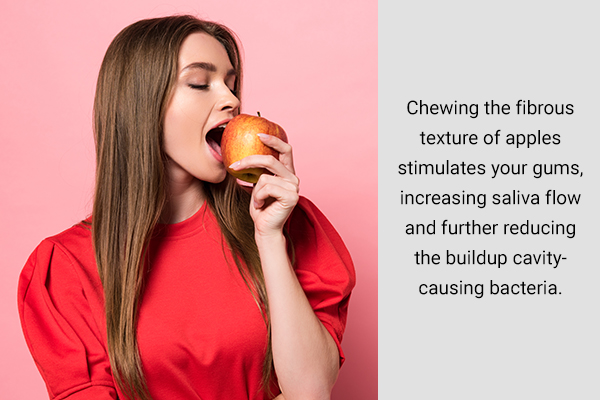
An “apple a day” is great for the teeth, too.
Although not a substitute for brushing and flossing, eating an apple or other fibrous fruits such as oranges, carrots, or celery helps clean your teeth and increases salivation, which can neutralize the citric and malic acids left behind in your mouth.
This is because chewing the fibrous texture of apples stimulates your gums, increasing saliva flow and further reducing the buildup cavity-causing bacteria. And more saliva is good because it decreases the acidity in your mouth and washes away food particles that cause decay. (10)
How to consume:
Be sure your diet includes citrus and other fresh fruits rich in vitamin C, such as apples, pears, strawberries, pineapples, tomatoes, and cucumbers.
Note: Prepare the juice of fresh apples at home rather than consuming commercially available sugary apple juice, which may contribute to tooth decay.
11. Drink wheatgrass juice
The natural antibacterial properties of wheatgrass help fight tooth decay and cavities as well as reduce the pain resulting from cavities. (11)
Plus, wheatgrass is a highly concentrated source of vitamin A and E along with minerals including iron, calcium, and magnesium, which are essential for healthy and strong teeth.
How to consume:
- Drink ½ glass of wheatgrass juice daily on an empty stomach as a preventive measure to fight cavities.
- Another option is to mix 1 part wheatgrass juice with 6 parts water. Swish the mixture in your mouth for 1 minute and spit it out. Follow this treatment two to three times a day.
- You can also chew some wheatgrass slowly and thoroughly. This is considered a healthy exercise to make the gums and teeth strong.
Additional Tips to Prevent Tooth Decay and Cavities
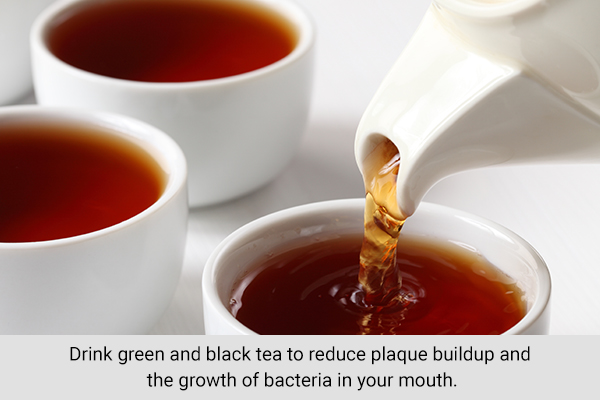
- Aside from brushing your teeth twice a day, floss twice a day and clean your tongue daily. These will help keep your teeth clean and wipe off any remaining food particles and cavities. An electric toothbrush is found to be more effective in plaque removal than manual brushing. A water pick is an additional aid that can be very useful in patients with dental bridges/implants/braces or motor coordination disorder where flossing may be difficult.
- Regularly use an antibacterial mouthwash. This can help kill bacteria, remove plaque, and prevent gum disease.
- Rinse your mouth with warm water after every snack or drink.
- Avoid foods and drinks with refined sugar as they create an acidic environment upon contact with plaque. These include sugary or acidic drinks.
- Refrain from drinking or eating foods just before bedtime. If you do so, make sure you brush your teeth after.
- Drink green and black tea to reduce plaque buildup and the growth of bacteria in your mouth.
- Chew sugar-free gum to stimulate the production of saliva and promote your oral health.
- Drinking cranberry juice regularly also helps improve oral hygiene.
- Make sure to eat foods rich in vitamin A, D, E, and K, as well as enough calcium, phosphorus, magnesium, and other key minerals.
- Eat high-fiber foods to help increase the production of saliva in your mouth, which serves as a natural protector for your teeth.
- Take a vitamin D supplement.
Final Word
The above listed tips and remedies can help you naturally avoid cavities by minimizing tooth decay, but they are not an alternative for medical treatment.
You must first consult your dentist to determine the severity of your problem and then proceed as per their discretion. That said, these complementary measures can definitely help provide additional relief from tooth pain, reduce bacteria in the mouth to keep infections at bay, and facilitate faster healing.

- Was this article helpful?
- YES, THANKS!NOT REALLY


